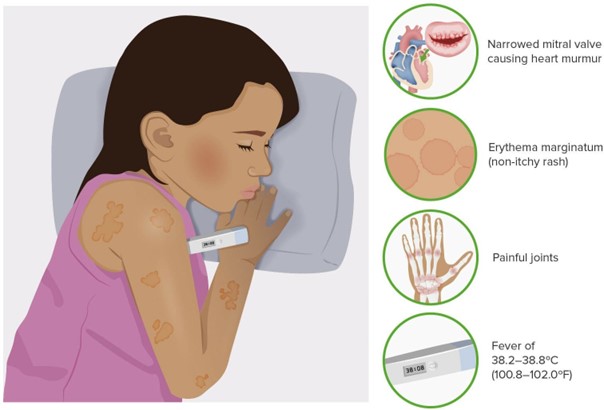A 7-year-old child is admited to the hospital with a diagnosis of acute rheumatic fever. In obtaining a health history from the child's mother, the recent occurrence of which illness is most significant?
Mumps.
Chickenpox.
Sore throat.
Influenza.
The Correct Answer is C
Acute rheumatic fever is a serious inflammatory condition that can develop after a streptococcal infection, particularly if the infection is not treated or resolved properly. The most common initial symptom of acute rheumatic fever is a sore throat, which is usually accompanied by a fever and swollen lymph nodes.
While mumps, chickenpox, and influenza are all infectious diseases, they are not directly linked to the development of acute rheumatic fever. However, a recent or untreated streptococcal infection (such as strep throat) can lead to the development of acute rheumatic fever.
Therefore, when obtaining a health history from a child with a diagnosis of acute rheumatic fever, it is most significant to inquire about recent or untreated sore throat, as this is the most likely cause of the condition.

Nursing Test Bank
Naxlex Comprehensive Predictor Exams
Related Questions
Correct Answer is D
Explanation
The absence of continuous headaches in the child indicates that the VP shunt is functioning normally. A VP shunt is used to treat hydrocephalus by draining excess cerebrospinal fluid from the brain to the abdomen. If the shunt is functioning properly, it should relieve pressure on the brain and reduce symptoms such as headaches. The other options (A, B, and C) do not directly indicate whether the shunt is functioning normally or not.

Correct Answer is ["1"]
Explanation
1 teaspoon.
The child has been prescribed loratadine 5 mg once a day. The botle is labeled "Loratadine for Oral Suspension, USP 5 mg per 5 mL." This means that for every 5 mL of the suspension, there is 5 mg of loratadine. Since 1 teaspoon is equivalent to 5 mL, the nurse should instruct the parent to administer 1 teaspoon with each dose to provide the prescribed 5 mg of loratadine.

Whether you are a student looking to ace your exams or a practicing nurse seeking to enhance your expertise , our nursing education contents will empower you with the confidence and competence to make a difference in the lives of patients and become a respected leader in the healthcare field.
Visit Naxlex, invest in your future and unlock endless possibilities with our unparalleled nursing education contents today
Report Wrong Answer on the Current Question
Do you disagree with the answer? If yes, what is your expected answer? Explain.
Kindly be descriptive with the issue you are facing.
